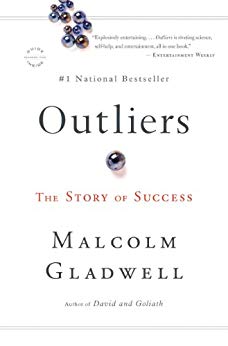

This article is an excerpt from the Shortform summary of "Outliers" by Malcolm Gladwell. Shortform has the world's best summaries of books you should be reading.
Like this article? Sign up for a free trial here .
What is Malcolm Gladwell’s Outliers about? What is the key message to take away from the book?
Outliers is a collection of stories, each exploring a variety of external factors that contribute to success. Malcolm Gladwell argues that extraordinarily successful people—or outliers—reached that point not just because of hard work and determination, but also thanks to luck, timing, and opportunities. He challenges the notion of self-made success through anecdotes and insight from various disciplines, including history, sociology, and psychology.
Here’s our book review of Outliers by Malcolm Gladwell.
About the Author
Malcolm Gladwell is a New Yorker staff writer and author of several bestselling books that have earned him worldwide fame and millions of fans for his captivating style of writing and unusual subjects. Gladwell blends storytelling with social science research to offer new perspectives on topics such as how trends catch on and when to trust your intuition. His books—which include five New York Times bestsellers and have sold millions of copies in dozens of countries—have popularized concepts such as the “broken windows theory,” the Pareto principle, the “stickiness factor,” or the “talent myth.”
His parents—a British math professor and a Jamaican psychotherapist—nurtured Gladwell’s natural curiosity from a young age. (In fact, he was such an avid reader that he says his mother let him skip school when he wanted to because she knew he would spend his off-day reading at home.) Gladwell enrolled in college at just 16, earning a bachelor’s in history from the University of Toronto. After struggling to land a job in advertising, as he’d hoped, he began his writing career.
- He started out at The American Spectator before joining The Washington Post in 1987, where Bob Woodward was a colleague. Gladwell says he learned a great deal from watching Woodward, the investigative journalist who helped break the Watergate Scandal and remains at the Post as an associate editor.
- In 1996, he became a staff writer at The New Yorker. There, he published the article that spawned his first book, The Tipping Point (2000).
Gladwell has published seven books and co-founded the podcast and audiobook production company Pushkin Industries, where he hosts the podcast Revisionist History. Additionally, an Outliers series is reportedly in development for HBO Max.
Despite Gladwell’s broad acclaim, he’s also been widely criticized for misusing academic research. Specifically, critics claim that he cherry-picks evidence to support his theses, often using small, obscure, and unreliable studies and failing to present contradictory research. Some critics have even dubbed him “America’s Best-Paid Fairy-Tale Writer.”
In response, Gladwell has said that he is primarily a journalist and a storyteller who wants readers to consider new perspectives on cultural phenomena. When describing his approach, Gladwell says that he enjoys playing with ideas and that his books give him a forum to “think in public.” While some argue that Gladwell’s wide popularity and powerful platform turn his published ponderings into the public narrative, he has been reluctant to shoulder that burden—instead, he puts the onus on readers to recognize that he’s offering an alternative or expanded view, rather than delivering a definitive explanation.
Connect with Malcolm Gladwell:
The Book’s Publication
Outliers was published in 2008 by Little, Brown and Company, a division of the Hachette Book Group. It is available in hardcover and paperback, and as an ebook and audiobook.
Outliers was Gladwell’s third non-fiction book, after The Tipping Point and Blink. Like his books before and since, Outliers was a New York Times bestseller. On one hand, this book features Gladwell’s signature writing style—narrative-nonfiction punctuated with social psychology—and fits the pop-economics genre he created with his previous books. However, it is also somewhat of an outlier: In the “Reading Group Guide” at the end of the book, Gladwell writes that this book puts more emphasis on people and their stories, rather than concepts and principles.
Historical Context
Although Gladwell’s focus on success in Outliers was personally relevant, given the extraordinary success he’d achieved after publishing his first two books, the book was also culturally relevant after the relative prosperity of the previous decades.
As the United States enjoyed a healthy economy through the 1980s and ‘90s, pop-cultural images were glitzy and idealized. Americans worked longer hours, made bigger paychecks, and bought bigger cars and homes (cue the birth of the McMansion). At the same time, technology—from the personal computer to the cell phone—became a larger cultural and economic presence, while tech stars like Bill Gates and Steve Jobs became household names. It may be no wonder, then, that Gladwell uses Bill Gates as an example of an outlier in the book.
Although the early 2000s began with the dot-com boom and 9/11, they also spawned reality TV (Survivor premiered in 2000), social media (Friendster, MySpace, and Facebook launched in 2002, 2003, and 2004, respectively), and blogs. Collectively, these platforms created a new brand of supposedly self-made fame and success, arguably based more on exposure than talent. However, just a month before Outliers was published, the stock market crashed and an era of prosperity transitioned to an economic recession.
Intellectual Context
When Outliers was published in 2008, it made a strong case for the “nurture” side of the nature vs. nurture debate—that a person’s success relies at least as much on environmental factors as on genetics—at a time when there was broad support for the “nature” argument.
The Reign of the Nature Argument
In 1994, a book titled The Bell Curve argued that intelligence is largely determined by genes and that the intellectually elite naturally rise to power in the United States. The book drew fervent criticism for suggesting that Black Americans are intellectually inferior to whites and calling for an end to affirmative action. This view echoed statements by Nobel Prize-winning scientist James Watson, who co-discovered DNA (Watson maintained this view as recently as 2019), and by prominent psychologist Arthur Jensen, who concluded that racial differences in American children’s test scores were attributable to genetics rather than circumstances.
The Rise of the Nurture Argument
In 2003, psychologist Eric Turkheimer revealed an important caveat to the nature argument: He concluded that DNA determines a person’s potential, but that their environment determines whether they reach that potential. Gladwell continued to pick apart the idea that a person’s intelligence is tied to their race in a New Yorker article published less than a year before Outliers.
This book appears to elaborate on the New Yorker piece, while also giving some context to Gladwell’s own success, which had ballooned by this point to a level far beyond what most writers enjoy. In the book, he writes about the unique circumstances that benefited him—for instance, if his mother had been born a few years earlier, she wouldn’t have gotten a high school education.
The Book’s Impact
Following the success of The Tipping Point and Blink, Outliers debuted in the number-one spot on The New York Times bestseller lists. It held the top position for 11 weeks, and the paperback version remained on the list for 274 weeks.
Some critics say that the optimism in Gladwell’s books is a major reason for his broad success. Where conventional ideas can be disheartening, Gladwell’s counterintuitive arguments on everyday phenomena tend to be hopeful. As he writes in the Reading Guide at the end of Outliers, each of his books (up to that point) offered alternative views of the world:
- The Tipping Point made the case that meaningful change is possible.
- Blink urged readers to recognize how powerful—and trustworthy—snap judgments can be.
- Outliers emphasizes that society and community play critical roles in individual success.
The success of Gladwell’s books helped to popularize a subgenre of nonfiction books similarly based on unconventional arguments. Those books include:
- Freakonomics, in which Steven Levitt and Stephen Dubner use economic principles to explain human behavior.
- The Wisdom of Crowds, in which James Surowiecki asserts that groups are collectively wiser than individuals.
- Everything Bad Is Good for You, in which Steven Johnson argues that pop culture is making us smarter, not dumber.
Critical Reception
Gladwell has such a distinct style that much of the praise and criticism for Outliers is consistent with reviews for nearly all of his work.
- Fans praise his simple, engaging writing and his easy-to-understand explanations of social science research.
- Critics accuse him of cherry-picking evidence to support his arguments and oversimplifying the research, both of which help Gladwell present an oversimplified reality. In an effort to offer unexpected explanations for common questions, critics say that Gladwell writes things that may be true, but don’t represent the full picture.
Paradoxically, Gladwell has said that his approach aims to help people understand the whole story by revealing things they didn’t know. He says that the new information is not meant to show people that what they thought was true is actually wrong—rather, it’s incomplete.
Interestingly, some Outliers book reviews highlighted that the notion that someone’s environment and circumstances play a substantial role in their success is obvious, even though Gladwell presents it as a contradiction to the self-made man myth.
Commentary on the Book’s Approach
Gladwell opens Outliers by defining an outlier and using an example to demonstrate that external circumstances are often equally or more influential in creating outliers than innate traits. He explains that this is his thesis for the book.
Gladwell focuses on two types of external factors: opportunities and cultural legacy. In Part 1, he examines various types of opportunities that enable people to reach outlier-level success; these include the timing of their birth and their family’s style of parenting. In Part 2, he presents three types of cultural legacies and how those legacies foster social norms that impact an individuals’ behavior and trajectories. In the epilogue, Gladwell examines the opportunities and circumstances that contributed to his own success.
In his signature style, Gladwell centers each chapter’s principle around a case study. From the rags-to-riches story of a Jewish lawyer in Chapter 5 to the harrowing tale of a plane crash in Chapter 7, Gladwell uses colorful storytelling and rich details to bring these anecdotes—and the principles they support—to life.
———End of Preview———

Like what you just read? Read the rest of the world's best summary of "Outliers" at Shortform . Learn the book's critical concepts in 20 minutes or less .
Here's what you'll find in our full Outliers summary :
- What makes some people outliers, and most others not
- Why some genius outliers end up failing in life
- Why Asians are good at math, and other curiosities of culture






